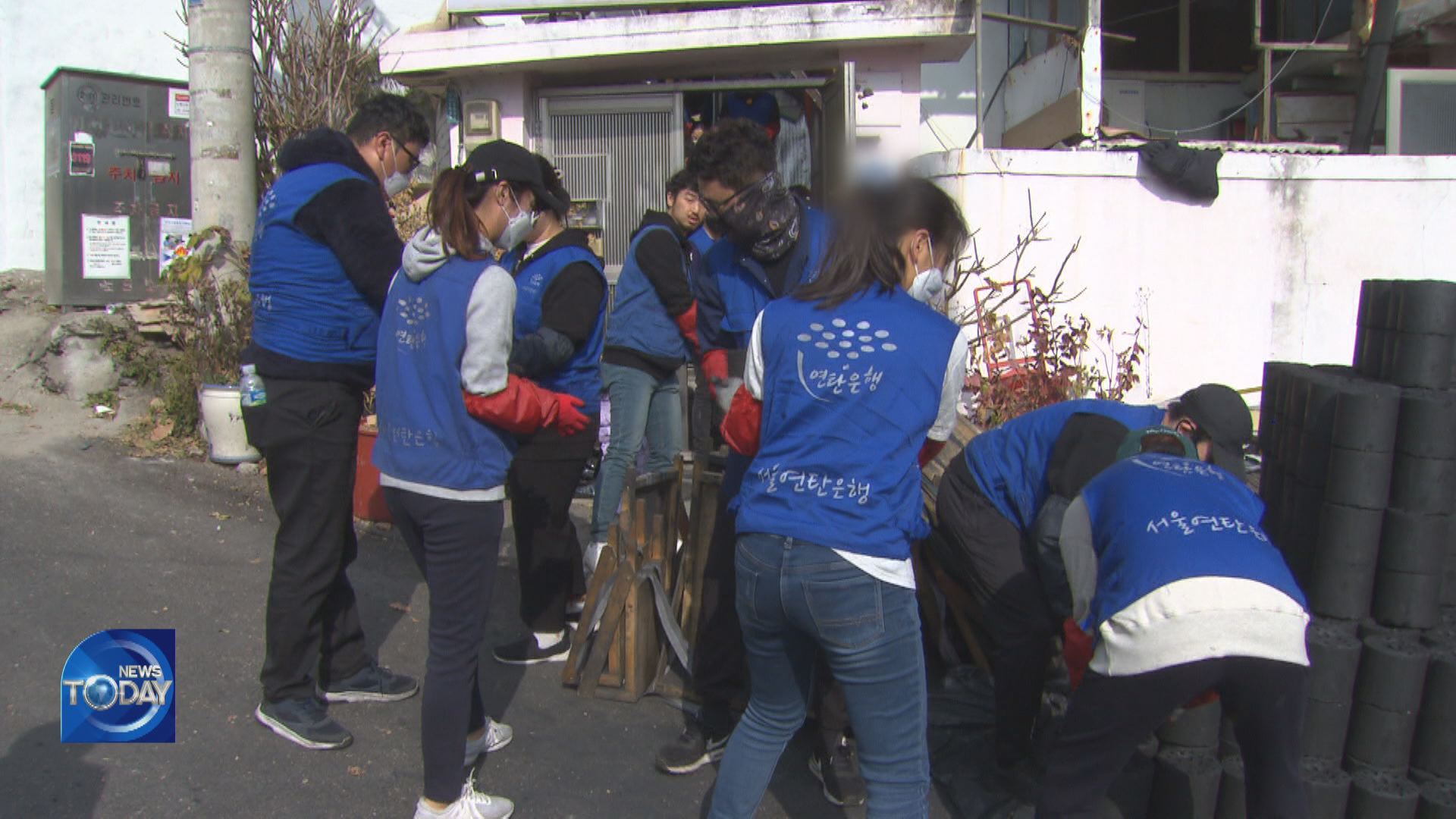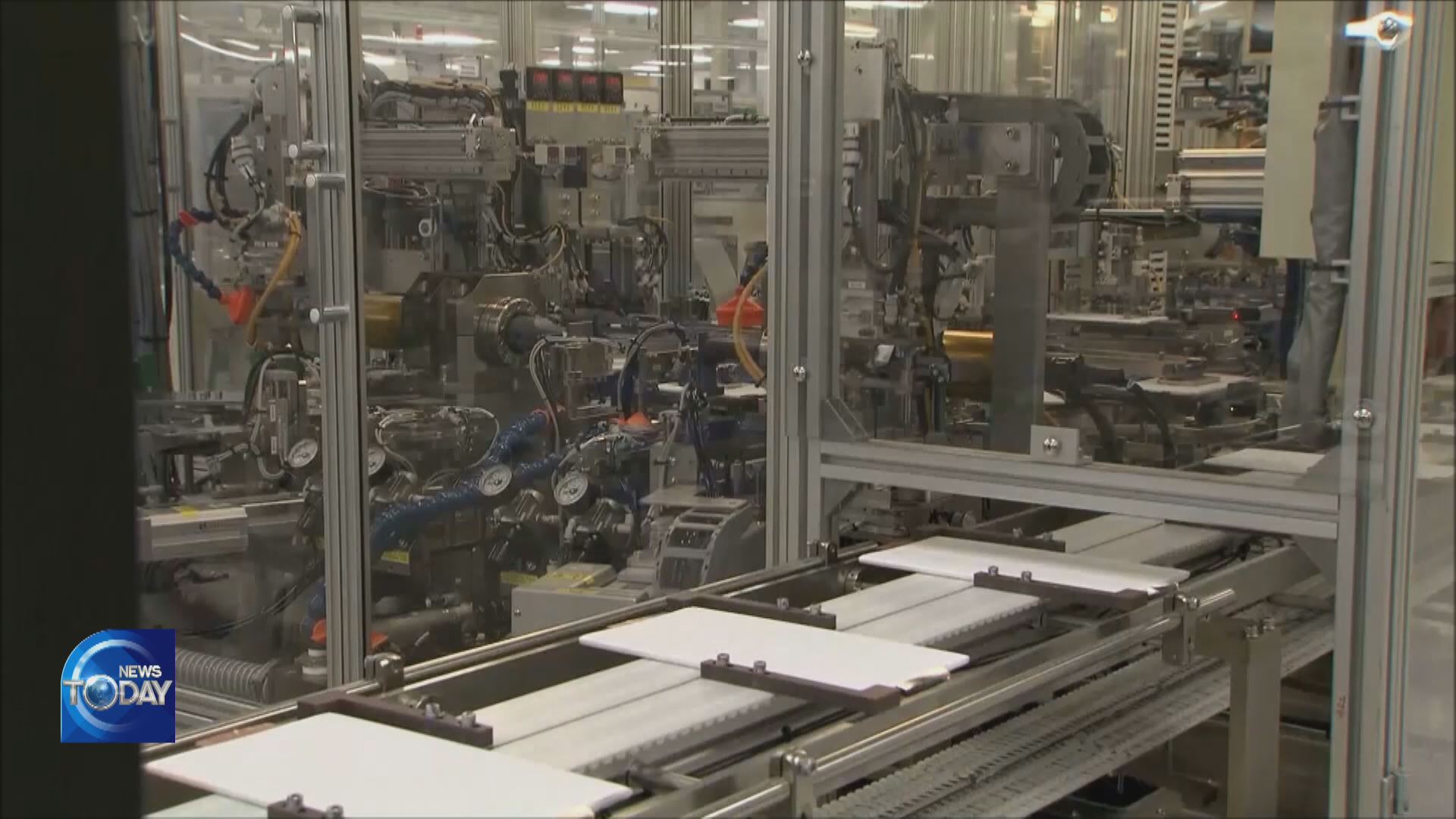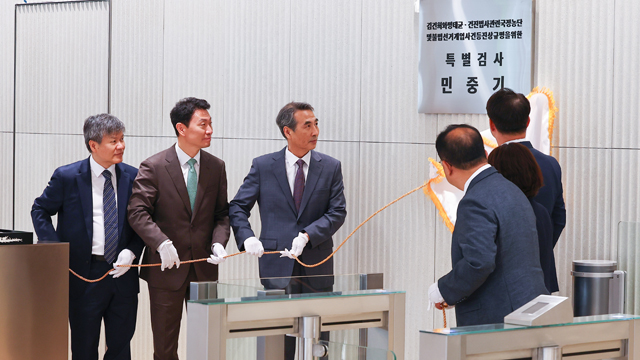COAL BLOCK DONATIONS SHRINK AMID INFLATION
입력 2022.11.21 (15:28)
수정 2022.11.21 (16:45)
읽어주기 기능은 크롬기반의
브라우저에서만 사용하실 수 있습니다.
[Anchor Lead]
The weather has been balmy for late November, but experts forecast a harsh winter for this year. People have been donating coal blocks for the needy ahead of the winter, but the recent inflation has caused coal block donations to shrink by half.
[Pkg]
This neighborhood in Seoul is comprised mostly of houses that are more than 60 years old. Some 400 households here survive the winter on coal briquettes.
[Soundbite] Lee Eun-ju(Seoul Resident) : "It’s too cold without coal briquettes. This is a shoddy house. I try to use less by keeping only the embers alive."
In the age of inflation, the manufacturing price of one coal block remained at 639 won. But coal delivery to a high location costs extra, making it hard for the village residents to heat their homes as much as they’d like.
[Soundbite] Kim Jae-ok(Seoul Resident) : "Coal delivery to this high area costs 100 won more per briquette. I changed to a coal boiler because the price of oil was too high. Two-thirds of my household expenses are spent on heating."
[Soundbite] "Let’s push ourselves a bit more so they can have a warm winter."
These volunteers have come to deliver coal briquettes. They are working hard to ensure a warm winter.
[Soundbite] Park Jin-woo(Coal Delivery Volunteer for 8 Years) : "If I work a little bit harder, they could have a warmer winter. That's why I work hard."
More than 2,000 volunteers had participated in the briquette sharing program before the pandemic. Now the number has plunged to around 700. Storage sheds used to be packed with donated coal by November. But now the sheds stand empty. That is because coal donations from businesses and individuals have more than halved.
[Soundbite] Kim Sun-ye(Secretary General, Yontan Bank) : "I think the reason coal donations fell was because of inflation and high exchange rate. The number of volunteers also fell because of the fear of infection."
Roughly 81,000 households nationwide still use coal for heating in winter. The pandemic and inflation have impacted people’s charity and made the lives of the needy even more difficult.
The weather has been balmy for late November, but experts forecast a harsh winter for this year. People have been donating coal blocks for the needy ahead of the winter, but the recent inflation has caused coal block donations to shrink by half.
[Pkg]
This neighborhood in Seoul is comprised mostly of houses that are more than 60 years old. Some 400 households here survive the winter on coal briquettes.
[Soundbite] Lee Eun-ju(Seoul Resident) : "It’s too cold without coal briquettes. This is a shoddy house. I try to use less by keeping only the embers alive."
In the age of inflation, the manufacturing price of one coal block remained at 639 won. But coal delivery to a high location costs extra, making it hard for the village residents to heat their homes as much as they’d like.
[Soundbite] Kim Jae-ok(Seoul Resident) : "Coal delivery to this high area costs 100 won more per briquette. I changed to a coal boiler because the price of oil was too high. Two-thirds of my household expenses are spent on heating."
[Soundbite] "Let’s push ourselves a bit more so they can have a warm winter."
These volunteers have come to deliver coal briquettes. They are working hard to ensure a warm winter.
[Soundbite] Park Jin-woo(Coal Delivery Volunteer for 8 Years) : "If I work a little bit harder, they could have a warmer winter. That's why I work hard."
More than 2,000 volunteers had participated in the briquette sharing program before the pandemic. Now the number has plunged to around 700. Storage sheds used to be packed with donated coal by November. But now the sheds stand empty. That is because coal donations from businesses and individuals have more than halved.
[Soundbite] Kim Sun-ye(Secretary General, Yontan Bank) : "I think the reason coal donations fell was because of inflation and high exchange rate. The number of volunteers also fell because of the fear of infection."
Roughly 81,000 households nationwide still use coal for heating in winter. The pandemic and inflation have impacted people’s charity and made the lives of the needy even more difficult.
■ 제보하기
▷ 카카오톡 : 'KBS제보' 검색, 채널 추가
▷ 전화 : 02-781-1234, 4444
▷ 이메일 : kbs1234@kbs.co.kr
▷ 유튜브, 네이버, 카카오에서도 KBS뉴스를 구독해주세요!
- COAL BLOCK DONATIONS SHRINK AMID INFLATION
-
- 입력 2022-11-21 15:28:25
- 수정2022-11-21 16:45:13

[Anchor Lead]
The weather has been balmy for late November, but experts forecast a harsh winter for this year. People have been donating coal blocks for the needy ahead of the winter, but the recent inflation has caused coal block donations to shrink by half.
[Pkg]
This neighborhood in Seoul is comprised mostly of houses that are more than 60 years old. Some 400 households here survive the winter on coal briquettes.
[Soundbite] Lee Eun-ju(Seoul Resident) : "It’s too cold without coal briquettes. This is a shoddy house. I try to use less by keeping only the embers alive."
In the age of inflation, the manufacturing price of one coal block remained at 639 won. But coal delivery to a high location costs extra, making it hard for the village residents to heat their homes as much as they’d like.
[Soundbite] Kim Jae-ok(Seoul Resident) : "Coal delivery to this high area costs 100 won more per briquette. I changed to a coal boiler because the price of oil was too high. Two-thirds of my household expenses are spent on heating."
[Soundbite] "Let’s push ourselves a bit more so they can have a warm winter."
These volunteers have come to deliver coal briquettes. They are working hard to ensure a warm winter.
[Soundbite] Park Jin-woo(Coal Delivery Volunteer for 8 Years) : "If I work a little bit harder, they could have a warmer winter. That's why I work hard."
More than 2,000 volunteers had participated in the briquette sharing program before the pandemic. Now the number has plunged to around 700. Storage sheds used to be packed with donated coal by November. But now the sheds stand empty. That is because coal donations from businesses and individuals have more than halved.
[Soundbite] Kim Sun-ye(Secretary General, Yontan Bank) : "I think the reason coal donations fell was because of inflation and high exchange rate. The number of volunteers also fell because of the fear of infection."
Roughly 81,000 households nationwide still use coal for heating in winter. The pandemic and inflation have impacted people’s charity and made the lives of the needy even more difficult.
The weather has been balmy for late November, but experts forecast a harsh winter for this year. People have been donating coal blocks for the needy ahead of the winter, but the recent inflation has caused coal block donations to shrink by half.
[Pkg]
This neighborhood in Seoul is comprised mostly of houses that are more than 60 years old. Some 400 households here survive the winter on coal briquettes.
[Soundbite] Lee Eun-ju(Seoul Resident) : "It’s too cold without coal briquettes. This is a shoddy house. I try to use less by keeping only the embers alive."
In the age of inflation, the manufacturing price of one coal block remained at 639 won. But coal delivery to a high location costs extra, making it hard for the village residents to heat their homes as much as they’d like.
[Soundbite] Kim Jae-ok(Seoul Resident) : "Coal delivery to this high area costs 100 won more per briquette. I changed to a coal boiler because the price of oil was too high. Two-thirds of my household expenses are spent on heating."
[Soundbite] "Let’s push ourselves a bit more so they can have a warm winter."
These volunteers have come to deliver coal briquettes. They are working hard to ensure a warm winter.
[Soundbite] Park Jin-woo(Coal Delivery Volunteer for 8 Years) : "If I work a little bit harder, they could have a warmer winter. That's why I work hard."
More than 2,000 volunteers had participated in the briquette sharing program before the pandemic. Now the number has plunged to around 700. Storage sheds used to be packed with donated coal by November. But now the sheds stand empty. That is because coal donations from businesses and individuals have more than halved.
[Soundbite] Kim Sun-ye(Secretary General, Yontan Bank) : "I think the reason coal donations fell was because of inflation and high exchange rate. The number of volunteers also fell because of the fear of infection."
Roughly 81,000 households nationwide still use coal for heating in winter. The pandemic and inflation have impacted people’s charity and made the lives of the needy even more difficult.
이 기사가 좋으셨다면
-
좋아요
0
-
응원해요
0
-
후속 원해요
0

















이 기사에 대한 의견을 남겨주세요.